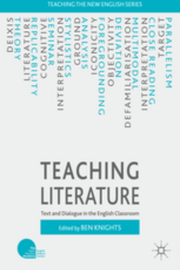Researching the Teaching of Literature
During 14 years of teaching secondary English (11-18) in comprehensive schools, I became particularly interested in aspects of teaching sixth form English. In particular, I was inspired by the new possibilities that the International Baccalaureate English programme offered at this level, and interested by the issues raised by the different teaching and learning implications of A Level and IB syllabuses. In seeking to develop my thinking, I eventually enrolled on a PhD at the Institute of Education, which I completed between 2003 and 2008. I chose then to return to part-time sixth form teaching in order to put unto practice some of the ideas I had worked on. I am now also a Curriculum Tutor at Oxford University, and continue to write about and research aspects of post-16 English teaching and the teaching of literature more generally.
Links to pdfs of my doctoral thesis and related articles may be found below. In the right hand column are details of published books and book chapters. PhD Thesis
| |||||||||||||||||||||||||||||||||||||||||||||||||||||||||||||||||||||||||||||||
| phdthesisfinal.pdf | |
| File Size: | 2328 kb |
| File Type: | |
The abstract is as follows:
This thesis is a study of the tensions between the different paradigms of literary study dominant at A Level English Literature and in university English. The central focus of the project is a multi-layered case study of a first year undergraduate course in English Studies, in which I examine the attitudes and behaviours of one class and its teachers in relation to their teaching and learning over the course of a year – focusing in particular on approaches to reading – using data collected from interviews with both teachers and students, and observations of lectures and seminars.
The project takes as its starting point the problematic relationship between A Level English Literature and English in higher education, and focuses on issues arising from students’ transition from A Level English Literature to university English. In particular it attempts to evaluate the extent to which students have been prepared by their experiences at A Level to assimilate approaches to literature teaching based in literary theory, and the extent to which such approaches might offer an appropriate model for the future development of A Level English Literature and arrangements for transition between secondary and tertiary English.
My analysis of the data suggests that the significant discrepancies between the way the subject is formulated at A Level and at university, and the consequent tensions between students’ and lecturers’ expectations of and assumptions about the course, can lead to significant problems in terms of access and motivation when students transfer to the university, and pose particular pedagogical challenges for lecturers. I argue that it is vital that approaches to curriculum and pedagogy at both levels take into account the implications of this transition in relation to the development of students’ subject knowledge, disciplinary awareness, and cultural values.
This thesis is a study of the tensions between the different paradigms of literary study dominant at A Level English Literature and in university English. The central focus of the project is a multi-layered case study of a first year undergraduate course in English Studies, in which I examine the attitudes and behaviours of one class and its teachers in relation to their teaching and learning over the course of a year – focusing in particular on approaches to reading – using data collected from interviews with both teachers and students, and observations of lectures and seminars.
The project takes as its starting point the problematic relationship between A Level English Literature and English in higher education, and focuses on issues arising from students’ transition from A Level English Literature to university English. In particular it attempts to evaluate the extent to which students have been prepared by their experiences at A Level to assimilate approaches to literature teaching based in literary theory, and the extent to which such approaches might offer an appropriate model for the future development of A Level English Literature and arrangements for transition between secondary and tertiary English.
My analysis of the data suggests that the significant discrepancies between the way the subject is formulated at A Level and at university, and the consequent tensions between students’ and lecturers’ expectations of and assumptions about the course, can lead to significant problems in terms of access and motivation when students transfer to the university, and pose particular pedagogical challenges for lecturers. I argue that it is vital that approaches to curriculum and pedagogy at both levels take into account the implications of this transition in relation to the development of students’ subject knowledge, disciplinary awareness, and cultural values.
Journal Articles
A number of papers and articles based on my doctoral research have been published. Links to pdfs of the articles may be found below.
Beyond English Literature A Level: The silence of the seminar? A study of an undergraduate literary theory seminar (English in Education, 2009)
This paper presents data from a doctoral study of the relationships between A Level English Literature and university English, a study which examines the experiences of one class of first year university English students. It argues that, whilst the socio-cultural emphases of literary study in the university have the potential to offer a great deal to students, full attention to the interplay between curriculum and pedagogy, and an understanding of the values and assumptions which students and lecturers bring to the literature classroom, are vital if students are to be genuinely engaged in the theoretical aspects of the discipline.
The definitive version of this article is available at wileyonlinelibrary.com, but a pdf may be downloaded here:
Beyond English Literature A Level: The silence of the seminar? A study of an undergraduate literary theory seminar (English in Education, 2009)
This paper presents data from a doctoral study of the relationships between A Level English Literature and university English, a study which examines the experiences of one class of first year university English students. It argues that, whilst the socio-cultural emphases of literary study in the university have the potential to offer a great deal to students, full attention to the interplay between curriculum and pedagogy, and an understanding of the values and assumptions which students and lecturers bring to the literature classroom, are vital if students are to be genuinely engaged in the theoretical aspects of the discipline.
The definitive version of this article is available at wileyonlinelibrary.com, but a pdf may be downloaded here:
| engined.pdf | |
| File Size: | 99 kb |
| File Type: | |
A Level Revamped English Literature, the Universities and the Schools (Changing English, 2007)
This paper examines current developments in A Level English Literature in the context of a long-running debate about the role of context and interpretation in the course, and explores the influence of university English on this debate. Following discussion of developments around Curriculum 2000, I trace the debate back to the ‘theory wars’ of the 1970s and 80s, examining the influence of voices from universities on discourses about the nature of literary study at A Level, and drawing out tensions within the secondary community between traditionalists, liberals and radicals. I suggest that there is now a strong move to bring A Level Literature closer to university English, and link this with similar movements in Australia and the US where sympathetic curricula and pedagogies, underpinned by critical theory, have been developed.
This article is available to read on the Changing English website, here: http://www.tandfonline.com/doi/full/10.1080/13586840701442919
I also have access to some free electronic copies so do contact me if you are unable to access it through the website.
This paper examines current developments in A Level English Literature in the context of a long-running debate about the role of context and interpretation in the course, and explores the influence of university English on this debate. Following discussion of developments around Curriculum 2000, I trace the debate back to the ‘theory wars’ of the 1970s and 80s, examining the influence of voices from universities on discourses about the nature of literary study at A Level, and drawing out tensions within the secondary community between traditionalists, liberals and radicals. I suggest that there is now a strong move to bring A Level Literature closer to university English, and link this with similar movements in Australia and the US where sympathetic curricula and pedagogies, underpinned by critical theory, have been developed.
This article is available to read on the Changing English website, here: http://www.tandfonline.com/doi/full/10.1080/13586840701442919
I also have access to some free electronic copies so do contact me if you are unable to access it through the website.
Beyond Curriculum 2000: Some National and International Perspectives on A Level English
Literature (International Journal of Adolescence and Youth, 2007)
This paper discusses and compares post-16 English Literature curricula in Australia and the UK, and the International Baccalaureate diploma, in the context of issues about breadth and depth in post-16 education, reflecting on the different structures and philosophies which have influenced approaches to teaching and learning at this level. It argues that, if A Level English students are to manage the transition to higher education effectively, and/or develop a broad, contemporary understanding of literature and literary studies, the post-16 literature curriculum in the United Kingdom needs to develop further in progressive directions informed by contemporary developments in higher education English, and by notions of critical literacy and cultural pluralism, as in the other systems described. It suggests that the effect of central government reforms in the United Kingdom, and the consequent weakening of professional networks at national and regional levels, as well as conflicts within the profession about the nature of literature teaching, are responsible for lack of progress in this regard.
Literature (International Journal of Adolescence and Youth, 2007)
This paper discusses and compares post-16 English Literature curricula in Australia and the UK, and the International Baccalaureate diploma, in the context of issues about breadth and depth in post-16 education, reflecting on the different structures and philosophies which have influenced approaches to teaching and learning at this level. It argues that, if A Level English students are to manage the transition to higher education effectively, and/or develop a broad, contemporary understanding of literature and literary studies, the post-16 literature curriculum in the United Kingdom needs to develop further in progressive directions informed by contemporary developments in higher education English, and by notions of critical literacy and cultural pluralism, as in the other systems described. It suggests that the effect of central government reforms in the United Kingdom, and the consequent weakening of professional networks at national and regional levels, as well as conflicts within the profession about the nature of literature teaching, are responsible for lack of progress in this regard.
| youthandadolescence.pdf | |
| File Size: | 113 kb |
| File Type: | |
Literature in the International Baccalaureate: an alternative for Sixth Form English (Use of English, 2004)
This article describes and reflects on some of the possibilities offered by the International Baccalaureate's approach to the study of literature.
This article describes and reflects on some of the possibilities offered by the International Baccalaureate's approach to the study of literature.
| iblitarticle.pdf | |
| File Size: | 88 kb |
| File Type: | |
Presentations
Below are powerpoint files from some recent presentations.
From School to University: some recent research into transition
A presentation given to the IB Schools and Colleges Association, Oxford 2010
A presentation given to the IB Schools and Colleges Association, Oxford 2010
| ibsca2.pptx | |
| File Size: | 94 kb |
| File Type: | pptx |
Poetry Across Sectors: poetry in schools and universities
A presentation given to the English Subject Centre, QMUL 2011
A presentation given to the English Subject Centre, QMUL 2011
| ibsca2.pptx | |
| File Size: | 94 kb |
| File Type: | pptx |
A Level to University English
A presentation given to the English Dept at QMUL, 2012
A presentation given to the English Dept at QMUL, 2012
| qmw.pptx | |
| File Size: | 114 kb |
| File Type: | pptx |
Developing Confident Responses to Literature at A Level
An introductory presentation at a workshop for teachers in Greenwich Local Authority, 2012
An introductory presentation at a workshop for teachers in Greenwich Local Authority, 2012
| greenwich.pptx | |
| File Size: | 87 kb |
| File Type: | pptx |
Criticism and Creativity in A level English Literature
An introductory presentation for a workshop for teachers at NATE Conference in 2009.
An introductory presentation for a workshop for teachers at NATE Conference in 2009.
| hinckley2009.ppt | |
| File Size: | 166 kb |
| File Type: | ppt |
Writing about the Teaching of Literature
In addition to the journal articles listed to the left, I have published one book and a number of book chapters, detailed below.
Teaching English Literature 16-19
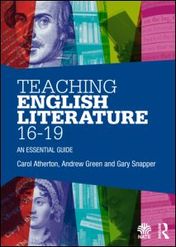
By Carol Atherton, Andrew Green and Gary Snapper, Routledge, 2013
'This new book represents a major step forward in the teaching of English Literature at 16-19... Principled, persuasive and packed with great teaching ideas... an essential handbook for anyone teaching English in the sixth form today'
Sean McEvoy, Varndean Sixth Form College, Brighton, author of Shakespeare: the Basics (Routledge).
With chapters on teaching poetry, the novel, drama, theory, context and writing, the book attempts to provide a comprehensive vision for the teaching of advanced English literature in schools and colleges in the 21st century.
'This new book represents a major step forward in the teaching of English Literature at 16-19... Principled, persuasive and packed with great teaching ideas... an essential handbook for anyone teaching English in the sixth form today'
Sean McEvoy, Varndean Sixth Form College, Brighton, author of Shakespeare: the Basics (Routledge).
With chapters on teaching poetry, the novel, drama, theory, context and writing, the book attempts to provide a comprehensive vision for the teaching of advanced English literature in schools and colleges in the 21st century.
International Perspectives on the Teaching of Literature in Schools
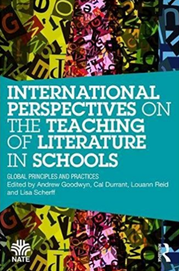
Teaching Literature: Text and Dialogue in the English Classroom
Making Poetry Matter
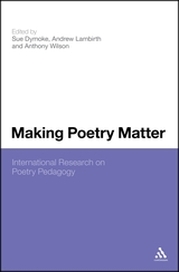
Edited by Sue Dymoke, Andrew Lambirth and Anthony Wilson, Bloomsbury 2013
Exploring Resistance to Poetry in Advanced English Studies
'Drawing on my research into advanced literature teaching, as well as experiences with students, teachers and lecturers, this chapter seeks to explore the nature of this advanced level resistance [to poetry], examining some of its manifestations in high school and university English, and reflecting on the ways in which it might be related to broader issues in the constitution of literary study in schools and universities.'
Exploring Resistance to Poetry in Advanced English Studies
'Drawing on my research into advanced literature teaching, as well as experiences with students, teachers and lecturers, this chapter seeks to explore the nature of this advanced level resistance [to poetry], examining some of its manifestations in high school and university English, and reflecting on the ways in which it might be related to broader issues in the constitution of literary study in schools and universities.'
International Perspectives on Teaching English in a Globalised World
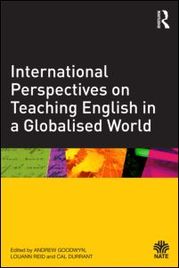
Edited by Andrew Goodwyn, Louann Reid and Cal Durrant, Routledge, 2013
Student, Reader, Critic, Teacher: Issues and Identities in Post-16 English Literature
'This chapter briefly outlines recent debates and developments in the relationship between high school and university English in the UK, before giving an account of a case study of transition between the two, and reflecting on some of the issues about teaching and learning in literary study which emerge from the project.'
Student, Reader, Critic, Teacher: Issues and Identities in Post-16 English Literature
'This chapter briefly outlines recent debates and developments in the relationship between high school and university English in the UK, before giving an account of a case study of transition between the two, and reflecting on some of the issues about teaching and learning in literary study which emerge from the project.'
Becoming A Reflective English Teacher
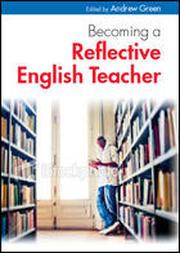
Edited by Andrew Green, Open University Press, 2011
Teaching Post-16 English
'This chapter ... examines some of the issues facing students and teachers when engaging in English post-16 (whether in A Level courses, the International Baccalaureate (I.B.) diploma or Scottish Highers), placing them particularly in the context of developments in thinking about post-16 English which have informed recent changes at A Level. It also suggests a range of pedagogic approaches which might be employed to tackle some of those issues.'
Teaching Post-16 English
'This chapter ... examines some of the issues facing students and teachers when engaging in English post-16 (whether in A Level courses, the International Baccalaureate (I.B.) diploma or Scottish Highers), placing them particularly in the context of developments in thinking about post-16 English which have informed recent changes at A Level. It also suggests a range of pedagogic approaches which might be employed to tackle some of those issues.'
The International Baccalaureate Diploma Programme: An Introduction for Teachers and Managers
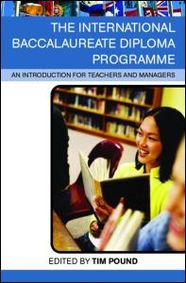
Edited by Tim Pound, Routledge, 2005
Marked for Life? Progression from the International Baccalaureate
'This chapter ... presents a commentary on the testimonies of ten of my ex-students which point to ways in which studying for the [IB] diploma may distinctly affect their later lives, and which offer a closer look at the nature of the IB as it is experienced by students, and at how IB students form a distinct identity.'
Marked for Life? Progression from the International Baccalaureate
'This chapter ... presents a commentary on the testimonies of ten of my ex-students which point to ways in which studying for the [IB] diploma may distinctly affect their later lives, and which offer a closer look at the nature of the IB as it is experienced by students, and at how IB students form a distinct identity.'
Articles in English Drama Media
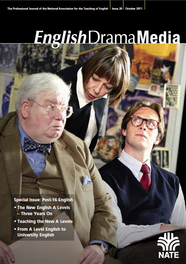
Pdfs of these articles may be found below.
2006: Beyond Dead Poet's Society: Developing Literary Awareness at A Level
2008: Voices Across Borders: Devolving English Literature in Schools
2011: From School to University: Travels between Sixth Form and University English
2011: Theoretically Speaking: Teaching Literary Theory in the New A Levels
2006: Beyond Dead Poet's Society: Developing Literary Awareness at A Level
2008: Voices Across Borders: Devolving English Literature in Schools
2011: From School to University: Travels between Sixth Form and University English
2011: Theoretically Speaking: Teaching Literary Theory in the New A Levels
2006:
Beyond Dead Poet's Society:
Developing Literary Awareness at A Level
Gary Snapper examines some of the tensions underlying the teaching of A Level English Literature and suggests some ways in which they might be resolved.
Beyond Dead Poet's Society:
Developing Literary Awareness at A Level
Gary Snapper examines some of the tensions underlying the teaching of A Level English Literature and suggests some ways in which they might be resolved.
| snapper_june_06.pdf | |
| File Size: | 470 kb |
| File Type: | |
2008:
Voices Across Borders:
Devolving English Literature in Schools
Gary Snapper gives an account of the experience of teaching Scottish and African literature in the
International Baccalaureate, arguing that the teaching of literature should pay greater attention to issues of literature, culture and politics.
Voices Across Borders:
Devolving English Literature in Schools
Gary Snapper gives an account of the experience of teaching Scottish and African literature in the
International Baccalaureate, arguing that the teaching of literature should pay greater attention to issues of literature, culture and politics.
| snapper_june_08.pdf | |
| File Size: | 1610 kb |
| File Type: | |
2011:
From School to University:
Travels between Sixth Form and University English
Gary Snapper reflects on classroom experiences and recent debates
which led him to explore the relationship between school and university
English, and on what he found when he followed a group of A Level Literature students to university.
From School to University:
Travels between Sixth Form and University English
Gary Snapper reflects on classroom experiences and recent debates
which led him to explore the relationship between school and university
English, and on what he found when he followed a group of A Level Literature students to university.
| snapper_oct_11.pdf | |
| File Size: | 135 kb |
| File Type: | |
2011:
Theoretically Speaking:
Teaching Literary Theory in the New A Levels
Literary theory has, since 2008, for the first time become a formal element of an A Level syllabus. Barbara Bleiman, Jake Lund and Gary Snapper reflect on teaching theory at this level and explore some of the lessons learnt from the first three years.
Theoretically Speaking:
Teaching Literary Theory in the New A Levels
Literary theory has, since 2008, for the first time become a formal element of an A Level syllabus. Barbara Bleiman, Jake Lund and Gary Snapper reflect on teaching theory at this level and explore some of the lessons learnt from the first three years.
| snapper_bleiman_lund_oct_11.pdf | |
| File Size: | 366 kb |
| File Type: | |
